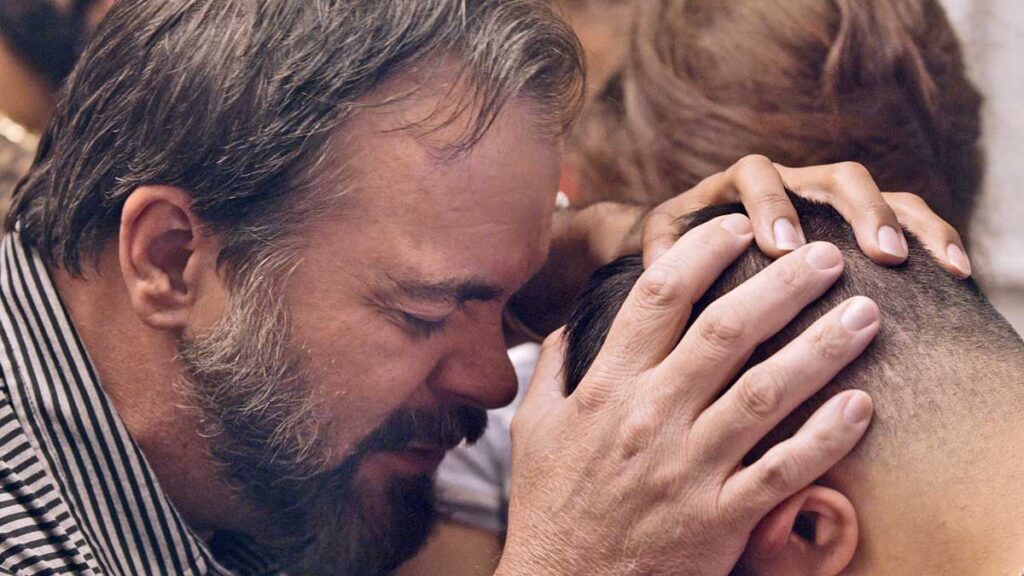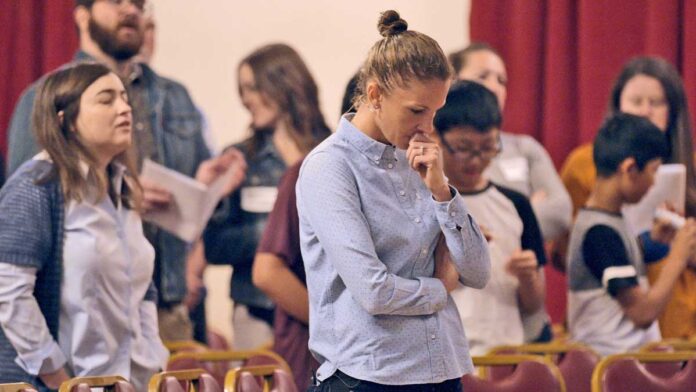“Pray Away,” a potent documentary out August 3 on Netflix, joins the numerous other features (“But I’m a Cheerleader,” Boy Erased,” “Save Me”) and documentaries (“Kidnapped for Christ,” and “For They Know Not What They Do”) that examine the insidious practice of gay conversion therapy. Director Kristine Stolakis offers smart case studies of several leaders at key organizations that are (or were) part of the ex-gay movement. While these men and women regret their deceitful actions towards the LGBTQ community, the film also showcases a man who continues to “pray the gay away.”
Yvette Cantu Schneider is a self-described “practicing lesbian,” who had many gay male friends die from AIDS. However, when she became involved with the church, with its structures and rules, she claimed she found a sense of “relief.” Her testimony is heartfelt and impassioned, and Stolakis lets Cantu Schneider tell her story in a way that is engaging. She looks back on videotapes of her anti-gay activism for The Family Research Council, a conservative group, and apologizes for her involvement with that organization. But she also acknowledges that this work was a part of her life. Despite her shame, she can’t throw these remnants away, holding on to them and letting them wound her like a cilice belt. It is a poignant and affecting moment.
One of the largest organizations that practiced gay conversation therapy was the now defunct Exodus, and three of its leaders — Michael Bussee, John Paulk, and Randy Thomas — appear in “Pray Away” and recount their involvement with the group. Stolakis treats each “confession” as a kind of atonement, but viewers may be too angry by the dishonesty to absolve these men.
Bussee explains that he founded Exodus as a (gay) man who wanted a support group for men like him who wanted to believe that by claiming God could change you, it could happen. However, he admits, the therapists at Exodus had no qualifications for their work. This makes the film’s archival footage of men struggling with their same-sex desires especially heartbreaking. And when Bussee confesses that he “pretended he was changed,” his guilt and lies allow viewers to judge him.

Likewise, Exodus Vice President Randy Thomas recounts the disillusionment he felt seeing the gay community protest the passing of California’s Prop 8 in 2008 — an anti-gay referendum he actively worked against his own self-interests to pass.
Such paradoxes are at the heart of this insightful film that shows how this harmful practice destroys the lives of the men and women who orchestrated it as well as the men and women who were taken in by it, willingly or not.
Case and point: John Paulk, Exodus’ dynamic spokesman, an ex-gay man who became the face of conversion therapy success. Paulk met Anne at Exodus, married her, and they had two kids. The couple promoted their heterosexuality in the media. But Paulk reveals that his “conversion” was based on behaviors, not feelings. He claims in the film that he never “made the gay go away.” When he went to a gay bar in Washington DC one night — and was recognized and “outed” — he was more afraid that he damaged the gay conversion therapy movement than the hurt he caused the LGBTQ community.
“Pray Away” tries to redeem Paulk, by including scenes of him with his current male partner, but the film does not easily invite forgiveness. Paulk’s ex-wife, Anne, was approached by Stolakis and declined participation in the film — perhaps a wise move on her part, since she is seen in footage continuing to promote her conversion success.
Arguably the most powerful story in the film belongs to Julie Rodgers, who came out to her religious parents as a teenager. They sent her to Living Hope ministries, run by Ricky Chelette (who also declined the filmmaker’s request for an interview). Rogers describes the irony of meeting other youths at Exodus conventions providing a “safe space” for her. But what is more disturbing is how Rodgers felt exploited when Chelette insisted she recount her sexual assault in her testimonies as a Living Hope speaker. This incident prompted her not just to question the conversion therapy, but also self-harm in self-hate.
Stolakis presents Rodgers’ emotional journey with absolute compassion, and the film crosscuts between Rodgers describing her most difficult experiences with a joyous one — her preparations to marry her girlfriend Amanda.
“Pray Away” shrewdly counterbalances its stories with Jeffrey McCall, who considered transgender surgery but transitioned to following God. He runs the Freedom March, an annual event for ex-gays and scenes show him and other ex-gays testifying.
In contrast, the film’s ex-ex-gay stories are more impactful. Hearing from folks who struggled with conversion therapy, and the anger and pain they faced, is where Stolakis’s critical documentary is truly devastating.
